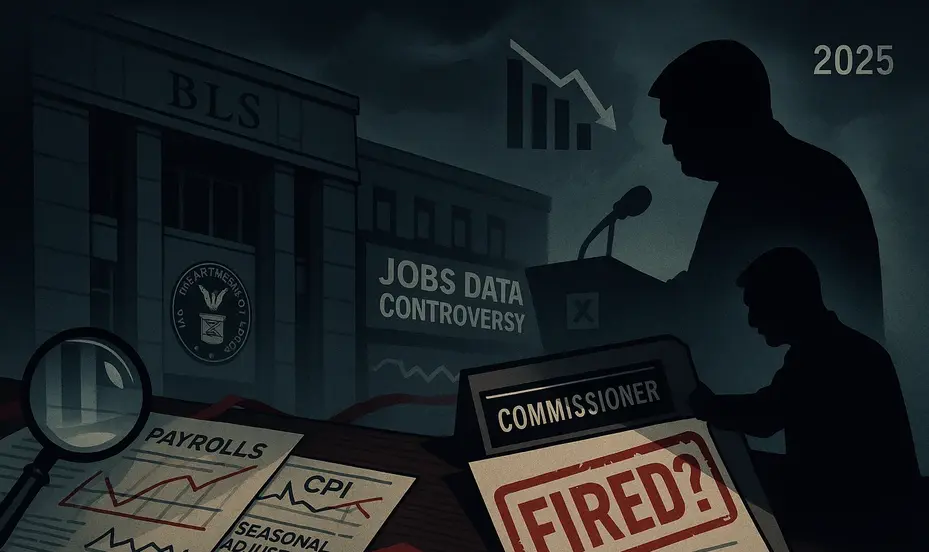The Trump BLS Commissioner Firing: A Statistical Crisis
The Trump BLS commissioner firing represents a watershed moment in the relationship between political leadership and statistical agencies. President Trump’s decision to dismiss the BLS commissioner over employment data revisions has created unprecedented tension between the executive branch and the statistical community. This action follows dramatic revisions to May and June employment figures that showed initial estimates were significantly off target, prompting concerns about data reliability and political interference.
The Trump BLS commissioner firing occurred after the Bureau of Labor Statistics released revisions showing that May and June employment figures were substantially different from initial estimates. While September’s revision was relatively minor at 1,000 jobs, and July’s revision was typical at 30,000 jobs, the May and June revisions were described as “way off,” creating the political pressure that led to the commissioner’s dismissal.
The Data Revision Controversy
The Trump BLS commissioner firing was precipitated by what President Trump characterized as “ridiculous” employment numbers that required significant revision. The Bureau of Labor Statistics conducts regular revisions to employment data as more complete information becomes available, but the magnitude of recent revisions has raised questions about the reliability of initial estimates.
The revision process is a standard statistical practice designed to improve accuracy as more data becomes available. However, the Trump BLS commissioner firing suggests that political leadership may not fully understand or accept the statistical methodology that underlies these revisions.
The Bureau of Labor Statistics Data Collection Process
The Trump BLS commissioner firing has brought unprecedented attention to how the Bureau of Labor Statistics collects and processes employment data. The jobs report, officially called the Employment Situation, relies on two distinct surveys that provide different perspectives on the labor market.
The household survey, which calculates the unemployment rate, interviews approximately 60,000 people monthly, asking questions about their employment status and reasons for unemployment. The establishment survey, which calculates nonfarm payroll employment, sends forms to 650,000 workplaces across the country, requesting information about employee counts, payroll data, and work hours.
The Response Rate Challenge
The Trump BLS commissioner firing has highlighted a critical challenge facing the Bureau of Labor Statistics: declining response rates to establishment surveys. When the initial jobs report is released, only about 60% of establishments have completed their surveys, creating the need for subsequent revisions as more data becomes available.
This low initial response rate is primarily due to businesses being too busy to prioritize survey completion, though other factors include business closures and personnel absences. The Trump BLS commissioner firing has raised concerns about whether political pressure might further reduce response rates if businesses fear their data could be used for political purposes.
The Revision Process and Statistical Integrity
The Trump BLS commissioner firing has cast a spotlight on the revision process that is fundamental to statistical accuracy. The Bureau of Labor Statistics conducts multiple rounds of revisions to employment data, with the goal of providing increasingly accurate estimates as more complete information becomes available.
Initial estimates are based on approximately 60% of establishment responses, while three-month revisions incorporate data from over 90% of establishments. The Trump BLS commissioner firing occurred after revisions showed that initial estimates for May and June were significantly inaccurate, though this level of revision is not unprecedented during periods of economic transition.
The Statistical Methodology Defense
Statistical experts have defended the revision process that led to the Trump BLS commissioner firing, arguing that revisions are a normal and necessary part of producing accurate economic data. The Federal Reserve and other policymakers rely on timely information to make critical decisions, making it essential to release preliminary data while continuing to improve accuracy through revisions.
The Trump BLS commissioner firing has raised concerns about whether political pressure might compromise the statistical independence that is essential for reliable economic data. Statistical agencies must maintain their independence to provide unbiased information that supports sound policymaking.
Looking to Hire Fast?
Hiring managers can now post jobs for free on WhatJobs and connect with millions of jobseekers.
👉 Post a Job Now →The Political Implications of Trump BLS Commissioner Firing
The Trump BLS commissioner firing has significant political implications that extend beyond the immediate controversy over employment data. This action represents a direct challenge to the independence of statistical agencies and raises questions about the role of politics in data collection and analysis.
The firing has created concerns about whether future employment data might be influenced by political considerations rather than statistical accuracy. This could have profound implications for economic policymaking, as the Federal Reserve and other institutions rely on reliable employment data to make critical decisions about monetary policy and economic regulation.
The Trust Crisis in Statistical Data
The Trump BLS commissioner firing has created a crisis of trust in statistical data that could have long-term consequences for economic policymaking. When political leaders question the integrity of statistical agencies, it undermines public confidence in the data that supports critical economic decisions.
This trust crisis is particularly concerning because employment data influences decisions about interest rates, fiscal policy, and business investment. The Trump BLS commissioner firing has raised questions about whether businesses and policymakers can continue to rely on BLS data with the same level of confidence.
The Economic Impact of Data Uncertainty
The Trump BLS commissioner firing has created uncertainty about employment data that could have significant economic consequences. Financial markets, businesses, and policymakers rely on reliable employment statistics to make critical decisions about investment, hiring, and economic policy.
The controversy surrounding the Trump BLS commissioner firing has raised questions about whether future employment reports will be viewed with the same level of credibility. This uncertainty could affect market volatility and business confidence, potentially impacting economic growth and employment decisions.
Market Reaction to Data Controversy
Financial markets have historically responded to employment data releases, with significant movements in stock prices, bond yields, and currency values based on jobs report numbers. The Trump BLS commissioner firing has created uncertainty about whether future employment data releases will be viewed as reliable indicators of economic health.
This uncertainty could lead to increased market volatility as investors and traders become more skeptical of employment data. The Trump BLS commissioner firing has raised questions about whether markets should continue to react to employment reports with the same level of confidence.
The Future of Statistical Independence
The Trump BLS commissioner firing has raised fundamental questions about the future of statistical independence in the United States. Statistical agencies have traditionally operated with a high degree of independence from political influence, allowing them to provide unbiased data that supports sound policymaking.
The firing has created concerns about whether this independence can be maintained in the face of political pressure. The Trump BLS commissioner firing represents a potential precedent that could influence how future administrations interact with statistical agencies.
The Role of Statistical Agencies in Democracy
Statistical agencies play a critical role in democratic governance by providing reliable information that supports evidence-based policymaking. The Trump BLS commissioner firing has raised questions about whether this role can be maintained when political leaders challenge the integrity of statistical data.
The independence of statistical agencies is essential for maintaining public trust in government data and ensuring that policy decisions are based on accurate information rather than political considerations.
The International Implications
The Trump BLS commissioner firing has international implications that extend beyond the United States. Other countries and international organizations rely on U.S. employment data to make decisions about trade, investment, and economic policy.
The controversy surrounding the Trump BLS commissioner firing has raised questions about whether international partners can continue to rely on U.S. employment data with the same level of confidence. This could affect international economic relationships and global market stability.
Global Market Confidence
International financial markets and investors rely on U.S. employment data to make decisions about global investment and economic policy. The Trump BLS commissioner firing has created uncertainty about the reliability of this data, potentially affecting global market confidence and international economic relationships.
The Path Forward for Statistical Integrity
The Trump BLS commissioner firing has created a critical moment for reassessing the role of statistical agencies in democratic governance. Moving forward, it will be essential to restore confidence in the independence and reliability of employment data.
This will require clear communication about statistical methodology, transparent revision processes, and strong institutional protections for statistical independence. The Trump BLS commissioner firing has highlighted the need for robust safeguards that protect statistical agencies from political interference.
Restoring Public Trust
Restoring public trust in employment data will require a concerted effort to demonstrate the independence and reliability of statistical agencies. This includes transparent communication about statistical methodology, clear explanations of revision processes, and strong institutional protections for statistical independence.
The Trump BLS commissioner firing has created an opportunity to strengthen the institutional framework that protects statistical independence and ensures reliable economic data for policymakers, businesses, and the public.
The Role of Congress and Oversight
The Trump BLS commissioner firing has raised questions about the role of congressional oversight in protecting statistical independence. Congress has a responsibility to ensure that statistical agencies can operate independently and provide reliable data without political interference.
This oversight role is particularly important in light of the Trump BLS commissioner firing, which has created concerns about whether political pressure might compromise statistical integrity. Congressional committees with jurisdiction over statistical agencies may need to strengthen protections for statistical independence.
Legislative Protections
The Trump BLS commissioner firing has highlighted the need for legislative protections that ensure statistical agencies can operate independently. This might include statutory protections for statistical independence, clear procedures for appointing and removing statistical agency leaders, and robust oversight mechanisms.
Frequently Asked Questions
Q: What led to the Trump BLS commissioner firing?
A: The Trump BLS commissioner firing was triggered by President Trump’s dissatisfaction with employment data revisions that showed initial estimates for May and June were significantly inaccurate. The president characterized the numbers as “ridiculous” and fired the commissioner over concerns about data reliability.
Q: How does the Trump BLS commissioner firing affect employment data reliability?
A: The Trump BLS commissioner firing has created uncertainty about the independence of statistical agencies and raised concerns about whether future employment data might be influenced by political considerations rather than statistical accuracy.
Q: What are the economic implications of the Trump BLS commissioner firing?
A: The Trump BLS commissioner firing has created uncertainty about employment data that could affect financial markets, business confidence, and economic policymaking. This uncertainty could lead to increased market volatility and reduced confidence in economic data.
Q: How can statistical integrity be protected after the Trump BLS commissioner firing?
A: Protecting statistical integrity after the Trump BLS commissioner firing requires strengthening institutional protections for statistical independence, improving transparency in data collection and revision processes, and ensuring robust oversight mechanisms.




